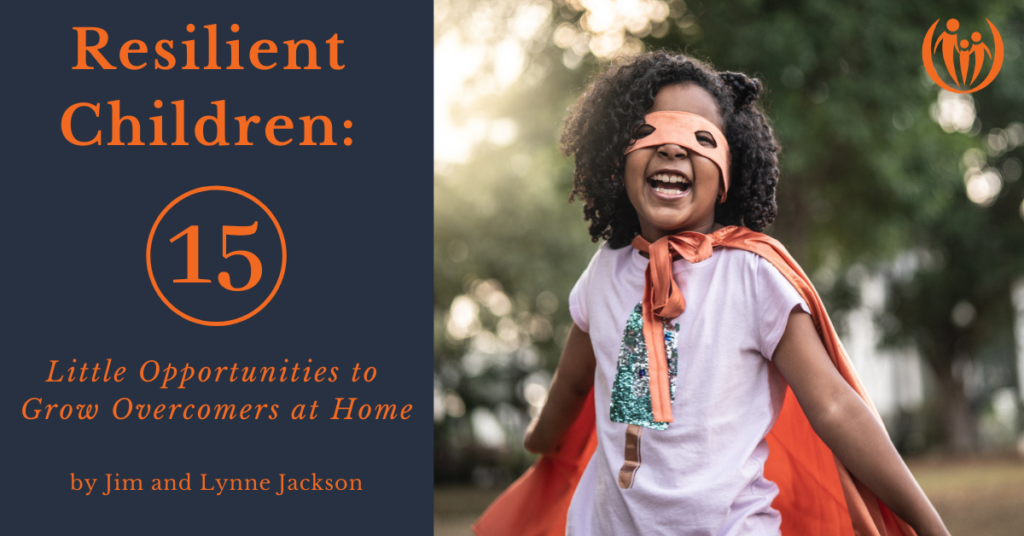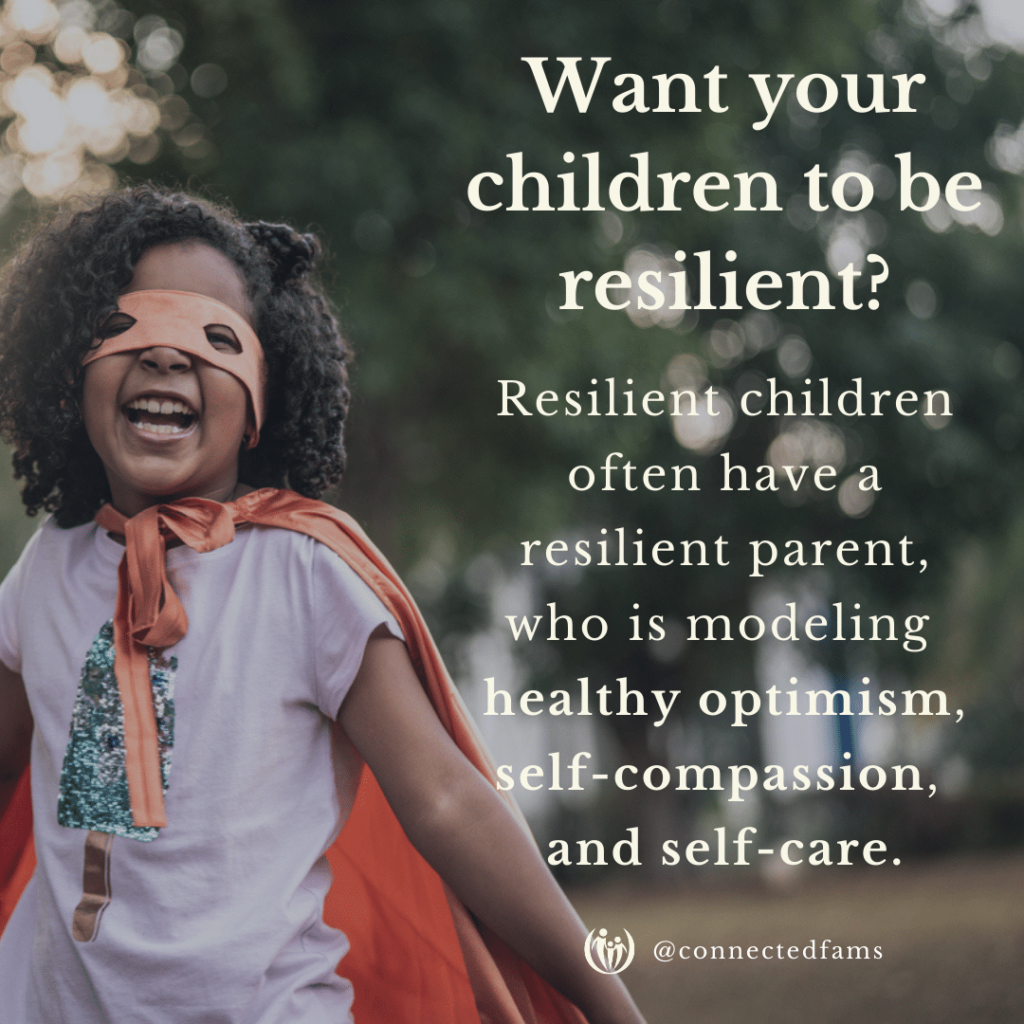
Resilient Children: 15 Little Opportunities to Grow Overcomers at Home

Have you ever wondered, “What makes resilient children so resilient?” or, “Is it nature or nurture that creates resilient children?”
Some kids seem to arrive in the world ready to take on anything. They’re optimistic, they see the good in the midst of hardship, and they feel unstoppable. Others are more sensitive and easily overwhelmed. If you’ve got more than one child, there’s a good chance you experience a bit of both in your family.
Resliency can be learned
Here’s the deal: Resilient children are not determined by personality. Even your more sensitive child can become more resilient! Temperament only plays one role in a child’s resilience. Help your kids (and yourself) embrace a growth mindset*, by recognizing that resiliency, and most other skills, can be developed and learned.
In our last article, we discussed a new mindset for helping our kids grow to be overcomers. Be sure to read it to ground yourself in
- What resilience is
- Why raising resilient children is worth the effort
- What both research and scriptures say about resilience!
Did you finish the last article and feel overwhelmed? Wishing you had some ideas for how to raise overcomers? Look no further. Using the research and biblical underpinnings from the last article, we’re now going to tease out the natural opportunities you might encounter throughout your day. These opportunities can develop resilient children!
Of course, you’re not going to implement all 15 ideas at once. The good news is, you may already be doing some of these things. (Great job! You’re already starting to raise resilient children, and you deserve a high five!) As you think through how you can encourage resilience in your children, pray about which opportunities your family is ready to put into action. Don’t worry about the rest.
Growth mindset is a term originally coined by Child Psychologist Carol Dweck and popularized by numerous authors. Our use of the term is most closely informed by her work.
A unique parenting framework that helps build resilient children
If you’ve read Connected Families’ articles in the past, you know that we use a unique parenting framework. We approach parenting through the lens of the messages we’re intentionally or inadvertently sending our kids. The four messages we want to send are:
- “You are safe with me.”
- “You are loved no matter what.”
- “You are called and capable.”
- “You are responsible for your actions.”
If you have never read our materials on the framework, go check it out here first. These 15 ideas are separated by the level of framework they fall under.
One quick review: In the last article we explained resilience using the Merriam-Webster definition, “an ability to recover from or adjust easily to misfortune or change.” That’s the goal of these 15 opportunities.
FOUNDATION: You are safe… to take risks and face adversity.
A strong foundation for helping your child learn resilience starts with insight into yourself. What lies might you believe about making mistakes? What’s going on inside of you when your child wants to give up?
These opportunities for “teaching” resilience are all about you. Resilient children often have a resilient parent, who is modeling healthy optimism, self-compassion, and self-care.
1. Love a good challenge.
Start by asking yourself honestly, what messages have you sent your kids about challenges and doing hard things? Try to make “obstacles” and “struggle” good words in your family. Around the dinner table ask, “Who took on a challenge today? Who worked hard at something when it was tough?” Make it a positive when your child brags about practicing a new skill that they haven’t mastered yet.
Notice how you talk about your challenges too. Do you talk about them at all? When was a time you were an inept beginner, but ended up learning to do something really important to you? It helps to talk about those times, not by complaining, but by sharing how you’ve experienced God’s presence right in the middle of challenges. Prioritize growth over success.
2. Notice the good in failure.
Especially when you’ve “failed,” take the time to see the good. Maybe you intended to make your kids’ favorite casserole, but you left it in the oven a little too long and had to put out a fire instead. As you laugh and eat ramen noodles or pizza delivery, talk about the good. Maybe you learned something new about your oven, or you deftly used some superhero antics with the fire extinguisher. Whatever it is, try not to ruminate on your failure as much as what you learned and what good came out of the failure. Laugh and show enjoyment in the middle of failure, whenever possible. Demonstrate to your kids that failure isn’t the enemy.
You could also talk about some of the many biblical characters who learned humility, compassion, and faith through their failure—Abraham, Moses, Peter, and Paul to name a few.
3. Model self-compassion.
Marriage and family therapist Kim Frederickson suggests that we make a goal of being our own best friend when facing a challenge or a mistake. Your best friend would never say things like, “I can’t believe you just did that! You’re such an idiot.” But how many of us say things like this to ourselves?
The thing is, your kids are tuned in to the way you approach your own mistakes. If you approach your mistakes with kindness, your kids will learn that making mistakes is natural and okay, and there’s always grace. For example,“Oops, I wish I had made a different choice, but God offers so much mercy when we confess we messed up. It was a really hard moment.” It helps to speak these kinds of statements aloud, so they can hear that you’re receiving God’s grace for yourself.
Spiritually, this is a really big deal. If righteousness could be gained through our efforts to be perfect then Christ died for nothing. Conversely, self-compassion in our failure models the reality of the Gospel. There is no condemnation for those who are in Christ Jesus, and our heavenly Father has compassion on his children – us!
But, “I’ve got to be perfect!”
Many Christians are hard on themselves in an unhealthy, legalistic “I’ve-got-to-be-perfect” kind of way, and I (Lynne) was one of them! Sometimes the image of a disapproving God tracking my many parenting failures sucked the life out of my joy and resilience. Understanding grace and learning self-compassion was a vital part of my journey and helped me to recover my joy and resilience for the inevitable challenges with my kids.
Through Christ, we have a solid foundation for self-compassion. May we walk in this richly (and bring our children into our process!) so that they would be drawn to the compassion and grace of Jesus when they fail.

4. Model self-care.
Self-care doesn’t mean a box of chocolates and a bath. (Though it could!) Mostly it means taking care of your body, mind, and soul so that when a challenge arises, you have the resources to tackle it.
Self-care could mean:
- Getting enough sleep
- Exercising your body
- Surrounding yourself with nature
- Eating nutritious food
- Making time for life-giving conversations and friendships
- Developing spiritual habits that draw you to God
Do what you need to do to be ready for life’s curveballs, and talk to your kids about why you’re making space for these activities. When you need to say no to something your kids want to do (because you’re prioritizing self-care) you’re modeling for them the message that taking care of yourself is important. In turn, they will learn that taking care of themselves is also important.
When life goes a little crazy (say, if there happens to be a global pandemic that has your family in quarantine, or somebody receives a really tough diagnosis), consider holding a “self care” family meeting. Ask each other questions like:
- How can we all practice self-care during this time?
- What do we need to take care of our bodies during this time?
- How can we prioritize relationships during this time?
- What can help us grow spiritually during this time?
CONNECT: You are loved, even when you fail or make mistakes.
Your child’s challenges and failures are unique, profound opportunities to send a message of truly unconditional love, again and again.
5. Show unconditional love, even during inconvenient failures and mistakes.
A really effective question when kids mess up, is to ask, “Do you think this makes me love you any less?” Posing this in a question, not a statement, can really get your child thinking. Carrie shared her story when her son got angry about a mistake.
How Carrie helped her son learn resilience:
When I picked Jared up from kindergarten he began drawing in the car. His start of a stick figure person got derailed when he accidentally drew a frown instead of a smile. He said, “I’m mad and sad! I did it all wrong!” I asked him, “Do I love you any less because you made a mistake on your drawing?” He hesitated, but said, “No.” “Would I love you more if you drew it just right?” and he answered, “No.”
I asked how he might be able to fix it or turn it into something else, like a lollipop or a tree. He then drew an elaborate tree house/ninja fort and when we got home he showed me which room was mine and that he was going to draw a present in it.
Jared went on to make me books, a book mark, etc. as gifts and even wrapped them up in a paper bag with a piece of paper taped on top. He was so proud of the new design and said, “I have such an awesome brain with good ideas!”
What a transformation in Jared with just a little unconditional love! If we can take a breath and remember to respond with grace when our child makes a mistake, we communicate it’s ok to fail and we encourage resilience.
But the more our child’s failure is an inconvenience to us, the easier it is to respond instead with frustration or an “I told you so…” lecture. Unfortunately, that pushes a child’s heart away and communicates that failure is not relationally safe. (In full transparency, both of us did that many times when the Jackson kids were young!)
Offering grace can encourage resilience
Instead, consider how you can offer grace to you and your child when you’re having a hard time. You might say something like:
“Hey, I don’t like how I responded. I’m sorry. Can I try again? I know you feel bad about what happened, but everybody makes mistakes – you and me! We’ll come up with a plan for how to fix it. But I want you to know, you’re way more important than this mess.”
Your light-hearted, affectionate do-over is a contagious demonstration of grace and resilience. And then you can remind your child that no past, present or future failure or sin can separate either of you from the love of Christ!
(To get your free downloads of this image in a variety of sizes click HERE.)

6. Express empathy by naming the feeling when your child fails.
Give kids the vocabulary to express frustration and discouragement. Feelings always seem bigger when you don’t have words for them, and that’s especially true of feeling like you’ve failed. Labeling a feeling sends calming signals to the fight/flight center in our brains. You can then better process how you’re going to work through that feeling. Or as Dan Siegel says, “Name it to tame it.” When you see your child beginning to give up too easily, try naming the feeling and suggesting a break rather than quitting.
You might say something like:
“Ouch, that fall really hurt, didn’t it? I can understand you feel frustrated and don’t want to try again, but falling is how we learn. Even if you don’t get it today, your brain will keep working on this, even while you sleep! Let’s give it one more try today, and then take a break.”
For the sensitive child that struggles with perseverance, this is the level of the framework where it becomes most evident. That doesn’t mean you aren’t seeing problems earlier on in the framework, at either the foundational or connect levels. What it does mean is this: If you want resilient children, it’s important for them to embrace the message, “You are called and capable.”
The upside is there are so many little ways you can encourage that sense of calling and capability. Here are a few.
7. Let your child experience adversity.
While many of us look back at our own difficult trials as valuable, strengthening experiences for us, we can sometimes be quick to rescue our kids from the same kinds of experiences. Our kids need to keep attempting difficult things.
James 1:2-4 says, “Consider it pure joy, my brothers, whenever you face trials of many kinds, because you know that the testing of your faith develops perseverance. Perseverance must finish its work so that you may be mature and complete, not lacking anything.”
In daily life, it’s tempting to want to insulate your children from trials. It can be painful to watch them struggle or suffer, and it’s often quicker, or easier, to help them. That’s how you might end up doing things for them that they could either do, or be taught to do, for themselves and for others. Unfortunately, this communicates, “You’re not capable of doing this.” It robs your child of an opportunity for growth and maturity—the learning of Spirit-led perseverance in trials.
So when you see your children face a difficult challenge, don’t jump in to protect them. Instead consider: “Lord, is there a valuable opportunity in this situation? How could I help my child grow through it?”
Then help your child cultivate a growth mindset: “This is difficult now, but if I keep at it, it will probably get easier as I get better at it.”
When our daughter wanted to quit before starting
Our daughter, with no volleyball experience, got up the courage to go to the first volleyball team meeting for her small high school, expecting it to be an “everyone can play” practice. But… it was a tryout! She felt so intimidated she called me in a panic, “Mom, come pick me up!”
I encouraged her to stay, and then Daniel got on the phone with that strong older brother authority: “Bethany, you can’t quit. You haven’t even started!” With hard work and determination, she had a great experience with volleyball throughout high school.
Wanting our kids to experience healthy adversity was a significant reason (besides our limited budget) that we chose camping for our primary means of vacationing with our young kids. And camping provides many opportunities for healthy adversity! Here are some ideas to get started camping with your family.

8. Stop nagging or micromanaging.
It’s not your job to prevent your child’s failure. Moreover, what message does your child receive with all the incessant reminders we love to give?
- “Don’t forget to pack your homework.”
- “Did you study for your science test?”
- “You gotta remember to choke up on the bat more…”
What your kids may hear is that they’re not really capable without your reminders and help. How discouraging is that? Many kids give up when they don’t feel the vote of confidence from their parents.
Read what happened when this mom had an epiphany – “I’ve decided to tell Greta that I’m not checking her grades until the end of the quarter. This is her life, it’s her grades, and it’s not a reflection on me.”
Ask curious questions
That doesn’t mean you can’t say anything. Asking curious, open-ended questions can guide your child toward wisdom, without sending an anxiety-ridden message of impending failure. In fact, this is such an essential skill that we have an entire online course devoted to learning to ask better questions.
An example of such a question might be, “How are you feeling about your science test prep?” Be careful to ask only if you are truly curious, not as a sideways means of nagging. Listen to the answer. Check in on your own motives by asking yourself, “Am I asking because I’m nervous about her test?” Then let it go.
Of course, this also gets back to your parenting foundation. If you’re parenting from a place of anxiety, it’s really hard to stop micromanaging! Take some time (even 30 seconds!) to rest your heart and ask God for His good vision for your child. Doing this will help you let go of your anxiety. It will stop the lie that, “Failure now means failure later.”
9. Point out resilient heroes, imperfections and all.
Help kids focus on a hero they look up to, and talk about how they overcame obstacles. Hang out together with someone who has overcome a lot in life and model asking thoughtful questions about how they were able to do that. You could also read the stories of Moses, Joseph, Daniel, Deborah, David, Ruth, and others who were “overcomers.” Maybe in your family lineage are stories of faithful overcomers you could tell. Celebrate the overcoming and wonder how your current family’s tenacity might bless a future generation.
10. Cultivate a positive, long-term perspective and identity as overcomers.
Sometimes when things are hard in the moment, it’s difficult to remember that “this too shall pass.” It’s even more difficult for children who have less experiences with conflict and challenges to put their current struggle into perspective.
That’s your opportunity to teach kids that God is making them into overcomers. Years after that crazy, windy camping trip, our kids have mentioned to us several times how leaning into an identity as an overcomer has helped them to take a breath, think through their options, and persevere through difficult times.
Remind kids of times they’ve faced challenges and come out on the other side. For example,
- If your child is overwhelmed by long division, remind them how once they struggled with subtraction, but now it’s second nature.
- If your child is struggling with the long months of the pandemic, read and discuss past pandemics and how they didn’t last forever.
- If your child feels they will never make friends in their new town, tell stories of your own experiences with moving and making new friends.
A word of caution:
Children are very concrete and susceptible to a rigid understanding that overcoming means winning or succeeding at an elusive goal. When they are not able to succeed at a goal, they may even feel shame about that.
Practically speaking, you might teach your child how to let go of a goal and be okay with that, knowing that they are loved no matter what and still walking in God’s purposes. As we explicitly teach our kids this message, it will also equip them with one of the key strengths of true resilience – being able to overcome the shame they may feel when they don’t “succeed”.
11. Nourish a healthy self-confidence in your child’s God-given abilities.
So often our kids use their gifts in misguided ways, but all kids have gifts that they can draw on to help solve difficult problems. Even when they’re not currently facing an overwhelming challenge, you can proactively point out to them the skills they show and the moments they use problem-solving well.
Nourish a positive view of their God-given abilities before a major challenge. Then, when adversity comes, your child will be less likely to give up, because they already know they are capable of solving problems and facing challenges. (Focus on the capabilities of your kids that will help them deal with something, and avoid implying that they are gifted in a way that makes them special above others.)

12. Memorize Bible verses to rely on during hard times.
As Jesus demonstrated when He was in the wilderness, scriptures can be a powerful tool to build resilience. When a challenge gets too big, these are the Truths that you and your children can lean into.
For example:
- “I have told you these things, so that in Me you may have peace. In this world you will have trouble. But take heart! I have overcome the world.” – John 16:33
- “Cast your cares on the Lord, and He will sustain you; He will never let the righteous be shaken.” – Psalm 55:22
- “For the Spirit God gave us does not make us timid, but gives us power, love and self-discipline.” – 2 Timothy 1:7
- “Do not be anxious about anything, but in every situation, by prayer and petition, with thanksgiving, present your requests to God. And the peace of God, which transcends all understanding, will guard your hearts and your minds in Christ Jesus.” – Philippians 4:6-7
All of these scriptures, and so many more, are treasures to store up for challenges and troubles. All of these scriptures can be used to encourage our kids when they’re struggling.
Consider how you can make memorizing scripture fun and a part of your family’s rhythms. Some families enjoy listening to scripture music together (Seed Family Worship has an album called Seeds of Courage that might be useful for this.) Other families enjoy memorization challenges, or making it a game. There’s not a right way of doing this, but if possible, take advantage of the younger years when rote memorization is easy and kids are naturally drawn to the challenge.
13. Find outlets for your child to serve others.
Kids want to know that their lives make a difference. The internal conviction, that they are called to receive and pass on God’s love and care for people, provides protection against some of the most dangerous lies of despair and depression.
Help your kids find that area where they matter—where they can make a contribution. It may be in a soup kitchen or a nursing home, or maybe it’s setting up a website for your church. Whatever it is, explore together areas where their interests and their ability to serve intersect.

Moreover, if we are to believe the experts, prioritize these areas of service and connection, even over outward “success.” Getting an “A” in biology won’t make a more resilient child, but helping your neighbor get her groceries might.
We still remember the day we showed up at a church to do a parenting seminar and were immediately surrounded by children. They offered us water bottles, a snack, and the headsets for our speaking amplification; even running the sound board! It was so awesome to see children serving so confidently at church.
A great example of resilience
Few have understood resilience better than Viktor Frankl, Holocaust survivor, psychiatrist, and neurologist. In Man’s Search for Meaning Frankl begs the reader to embrace a view that our life is given so that we can make some piece of the world better.
Frankl says:
“Don’t aim at success. The more you aim at it and make it a target, the more you are going to miss it. For success, like happiness, cannot be pursued; it must ensue, and it only does so as the unintended side effect of one’s personal dedication to a cause greater than oneself or as the by-product of one’s surrender to a person other than oneself. Happiness must happen, and the same holds for success: you have to let it happen by not caring about it. I want you to listen to what your conscience commands you to do and go on to carry it out to the best of your knowledge. Then you will live to see that in the long-run—in the long-run, I say!—success will follow you precisely because you had forgotten to think about it.”
Children that are easily overwhelmed by conflict may be tempted to rely on parents to manage their relationships, with siblings and even friends. Resist the temptation.
There are lots of articles about sibling relationships on our website, and the Sibling Conflict online course may be useful if this is a consistent problem in your home. We frequently hear from parents that their kids no longer come running for help when tempers flare, and even have a confident “we got this” attitude if parents step in and try to solve their conflict.
Verbally affirm the value of relationships, both in the family and with friends (model this too!). Resilience, mental health, and close relationships are all closely tied. Your kids need to learn to manage relationships, because they need relationships. Encourage your child’s friendships and let them manage them.
CORRECT: You are responsible for the projects you take on.
When you see your child giving up too easily, consider how you can encourage your child to own their responsibility for persevering or quitting. Part of growing resilient children is letting them face the consequences of not persevering.
15. Don’t protect your child from the natural consequences of quitting things.
You won’t always be able to stop your child from quitting. Sometimes they will give up too easily, and it will be costly. Other times, quitting may be the wisest action. For example, if they’ve taken on too much and something has to go, they’re going to be stuck making some hard choices.
Even when you sympathize with the hard choice, try not to cushion the natural consequences of quitting. It is important for our kids to learn the responsibility of managing priorities. Be a sounding board and an encouragement, but let your kids struggle through the fallout.
Some things to consider:
- If quitting a prerequisite course makes them ineligible for a desired course, don’t lobby for them in the school office.
- If quitting a group project negatively affects others in their group, brainstorm with them how they can make things right to those they’ve hurt.
- Figure out a way (even “hiring” them for extra chores) for them to reimburse you for fees for activities or lessons they quit.
- Help them to think through the consequences before giving up (and ideally before overcommitting), but then allow them to walk the hard road of living with their choices.
Whatever you do, keep on encouraging them, that even when they face consequences for poor choices, they are overcomers! And they can overcome even this hard situation.
Remember, resilient children come in all shapes
Yes, some kids are born taking on the world! They’re not easy to raise, but there’s no question they’ve got some natural resiliency reserves. However, there’s not a personality requirement to resiliency.
One of the most fascinating aspects of brain research on resilience is that it’s active. It’s not simply the absence of falling into depression or other less resilient states. It’s an active fight to adapt, change, and address the challenge you’re facing.
Your child (and you) can learn and grow in this active response to adversity. It won’t happen overnight! But the thousands of life experiences before this moment will play into how your child grows. But when you are determined to thoughtfully model and teach resilience, it will reap benefits for your child for the rest of their life.
_______________________
To learn more, register for our online course The Entitlement Fix: Growing Hard Work and Gratitude In Your Kids!
This fast-paced 4-session course is designed to give parents a solid strategy for stamping out entitled attitudes, and moving toward greater meaning in life.


